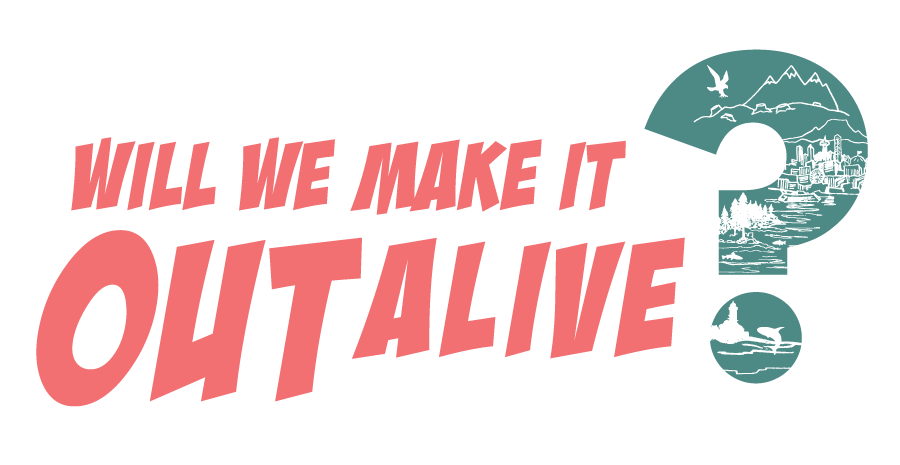Episode 9: Fire Must Burn
/What you don’t understand is, fire won’t burn if it’s rainy and miserable and cold and you really want it to burn…
As you may be able to tell from the title, this episode is all about fire (and maybe a little about cats). The Poop Detective starts us out with a funny story about a friend of ours who wouldn’t put out the fire and go to bed when it was late, everyone else was turning in, and he’d maybe had a few too many. Don’t worry, nothing burned that shouldn’t have (at least that night), even though he mansplained to us that fire must burn.
Our main segment this episode was on wildfires. Wildfires are natural processes and are important for healthy ecosystems, but with a changing climate, years of fire suppression, and new pressures from agriculture, development, mining and forestry, wildfire risk has been greatly increasing.
Fires are naturally caused by lightning, but the majority of fires in the US are caused by human activity such as unattended campfires, the burning of trash, and discarded lit cigarettes. The Poop Detective refers to a 2017 study from the University of Colorado which found that 84% of all fires in the US are caused by humans. The Magical Mapper found a wide range of percentages in a Google search so she conducted her own study based on data from the National Interagency Fire Center and found that on average, 86% of fires were caused by humans (over an 18 year period ending in 2018).
We’re seeing more fires earlier in the season this year, but even our recent large fires are not as large as historic fires!
The Poop Detective laments on the 2015 fire season, which had several impacts to our water-loving friends. A few of the things mentioned in the episode were that spring and summer stream flows hit a record low in Washington and Oregon, fish were dying from heat, the Columbia River lost over half of its returning sockeye salmon due to high river temperatures, and sea lions on the outer coast were having seizures from domoic acid poisoning. Oh, and we had an increase in wildfires. That season over 10 million acres burned with an estimated $2 billion spent on federal firefighting suppression.
The Poop Detective drops some history about some unimaginable huge early fires in the late 1800s that led to some early Forest Service practices that worked to prevent and suppress all fire as soon as possible. She then gets into different ideas of the cause and solution related to forest management and fires, including how some people think environmentalists are to blame for recent large wildfires.
I can’t breathe!!!
In more depressing news, the Poop Detective shares that the USDA predicts that the number of acres burned could triple by 2050, and the fire season in the western US has increased by 2 1/2 months since the 1980s. She then gets into the health effects of wildfire smoke and gets science-y about the size of particulate matter in smoke. These particulates not only include burned trees and vegetation, but also structures and all of the nasty hazardous materials that may be inside them!
We can do things to minimize fire risk though. Remember that humans cause the majority of wildfires, so humans can change their behavior and stop doing things that cause fires! The Red Cross has some great information on preventing wildfires, and the Firewise program is also a great resource for those living in the urban-wildland interface. More resources can be found here and here. The Poop Detective rounds out the segment by talking about groups such as Conservation Northwest, who are working to create more resilient forests and watersheds.
Finally, the Magical Mapper gets a chance to talk! She discusses geodatabase templates, which you can find out more about in our GIS Tools blog.
The Magical Mapper then talks about the EPA’s Smoke Sense app, which you can download and use during wildfire season. In order to participate in the citizen science study you have to be at least 18 years old, but you can answer questions about how wildfire smoke is affecting your health and measures you are taking or are willing to take in order to protect your health. The app also gives users information about current wildfires and smoke forecasts, and you can earn badges!
The Magical Mapper rounds out the episode with a stewardship opportunity (actually three opportunities) with the Cascade Forest Conservancy. You can help prep for prescribed fires by collecting important information about the locations of dead or downed trees, depth of duff and litter, and understory vegetation. You can also collect seeds from native shrubs and grasses, or help spread the seeds in areas impacted by fire. The first opportunity is coming up on June 29, 2019. View their website for these and other stewardship opportunities.
As always, please rate, review and subscribe on Apple Podcasts, Stitcher, or wherever you get your podcasts. Please let us know what you think at outalivepodcast.com or facebook.com/WillWeMakeItOutAlive. See you next month!



